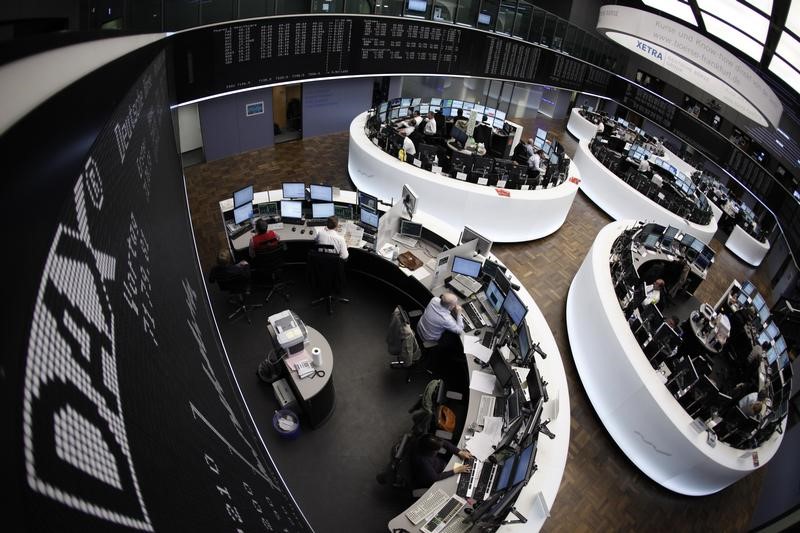By Georgina Prodhan
LONDON (Reuters) - European shares opened slightly higher on Tuesday as the Bank of England deemed that UK lenders could deal with a "disorderly" Brexit, while the dollar held steady ahead of a confirmation hearing for Federal Reserve chair nominee Jerome Powell.
The FTSEurofirst 300 (FTEU3) index of top European shares was up 0.3 percent, supported by financials, although a stumble in Chinese stocks for a second straight session kept the MSCI All-Country World index (MIWD00000PUS) flat.
European stocks were also buoyed by gains in Royal Dutch Shell (L:RDSa) after the oil major canceled an austerity dividend, while online grocer Ocado (L:OCDO) jumped following a deal with French supermarket Casino (PA:CASP).
The BoE said none of Britain's major lenders would need to raise extra capital if the country crashed out of the European Union, the first time it had come to such a conclusion since it started stress-testing banks in 2014.
But the chances of a hard Brexit were increased by the prospect of a snap election in Ireland which could be called as early as Tuesday, and which would complicate a key Brexit summit next month.
Euro zone government bond yields were pinned to recent lows as the Irish government teetered, with 10-year German yields - the regional benchmark - dropping to 0.33, barely 2 basis points of the November lows. <DE10YT=TWEB>
"If we have snap elections and then if a Brexit deal is in jeopardy then it will have a major impact," said DZ Bank analyst Sebastian Fellechner. "It could lead to a risk-off environment and be a disruptive factor in this very calm market."
The euro <EUR=> was steady at $1.1896, within reach of a two-month high, while the dollar eked 0.1 percent higher against a basket of six major currencies (DXY), after a boost overnight when President Donald Trump tweeted that a tax cut bill was "coming along very well".
Later, the U.S. Senate Banking Committee will hold a hearing to confirm Powell's nomination to the helm of the Federal Reserve. If confirmed, Powell will have to balance tightening policy against still sluggish wages and inflation.
"His opening comments support current market expectations that his appointment as Fed Chair is likely to maintain monetary policy continuity. The Fed's recent comments have signaled more concern over persistently low inflation, which has been weighing on the US dollar," wrote MFUG currency analyst Lee Hardman.
CHINESE SPILLOVER?
Earlier, Asian shares drifted from decade highs as Chinese stocks stumbled for a second straight session, with confidence dented by rising bond yields as Beijing intensified a crackdown on risky financing, threatening to squeeze corporate profits.
Chinese shares reversed early losses with the CSI 300 index (CSI300) ending up 0.2 percent following a heavy sell-off on Monday. Shanghai's SSE (LON:SSE) Composite index (SSEC) closed up 0.3 percent after volatile trading.
The CSI300 index has jumped 22 percent in 2017 so far, with the gains concentrated in a handful of large index-weighted stocks.
"The question is whether further downside in Chinese mainland equities continues in the session ahead and will there be a spillover into Hong Kong and potentially even Japan, Korea and Australia?" asked Chris Weston, Melbourne-based chief strategist at IG Markets.
Most of Asia was in the red, with Hong Kong's China Enterprises Index (HSCE) leading the losses. South Korea's KOSPI (KS11) showed a 0.2 percent gain.
The MSCI Emerging Market index (MSCIEF) was up 0.2 percent
Wall Street had been mixed on Monday, with the S&P 500 (SpX) off a touch, the Nasdaq (IXIC) losing 0.1 percent and the Dow (DJI) up 0.1 percent.
In commodity markets, U.S. light crude (CLc1) was down 55 cents at $57.56 amid uncertainty over a possible extension of output cuts by major crude producers and expectations of higher supply as the Keystone pipeline restarts.
Brent crude futures (LCOc1) were down 54 cents to $63.30.
Spot gold <XAU=> inched lower to $1,293.11.
